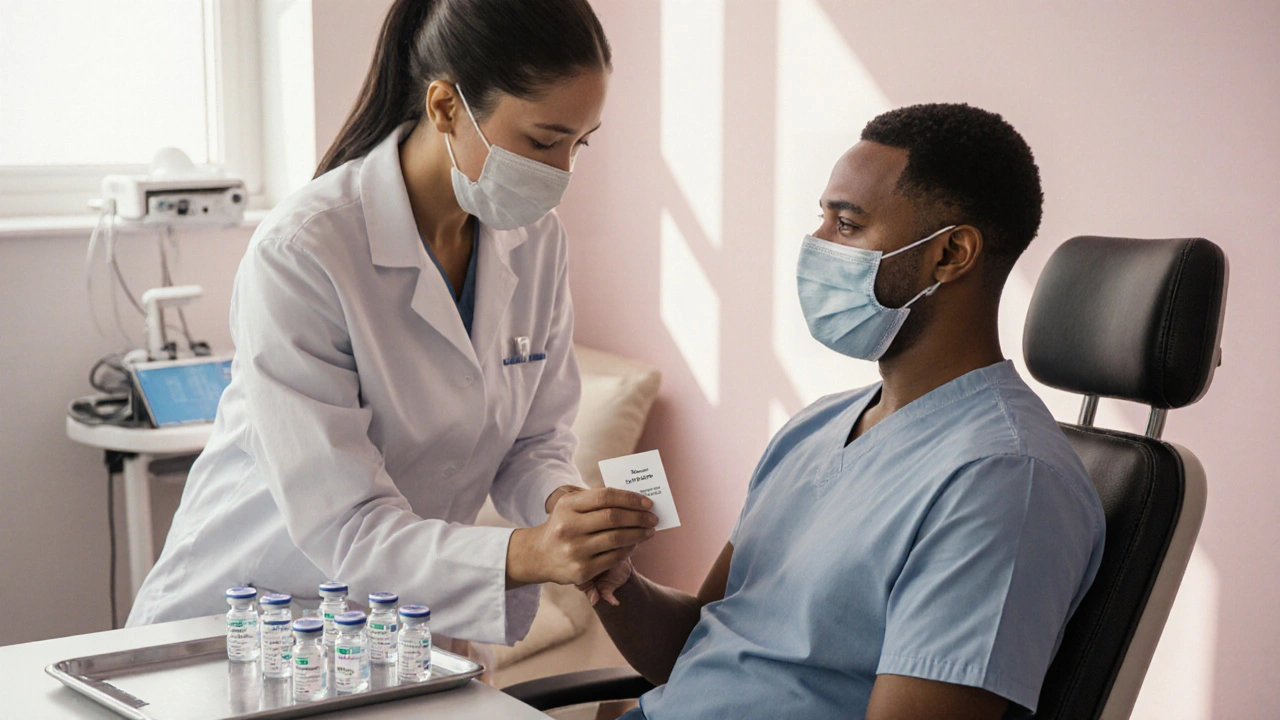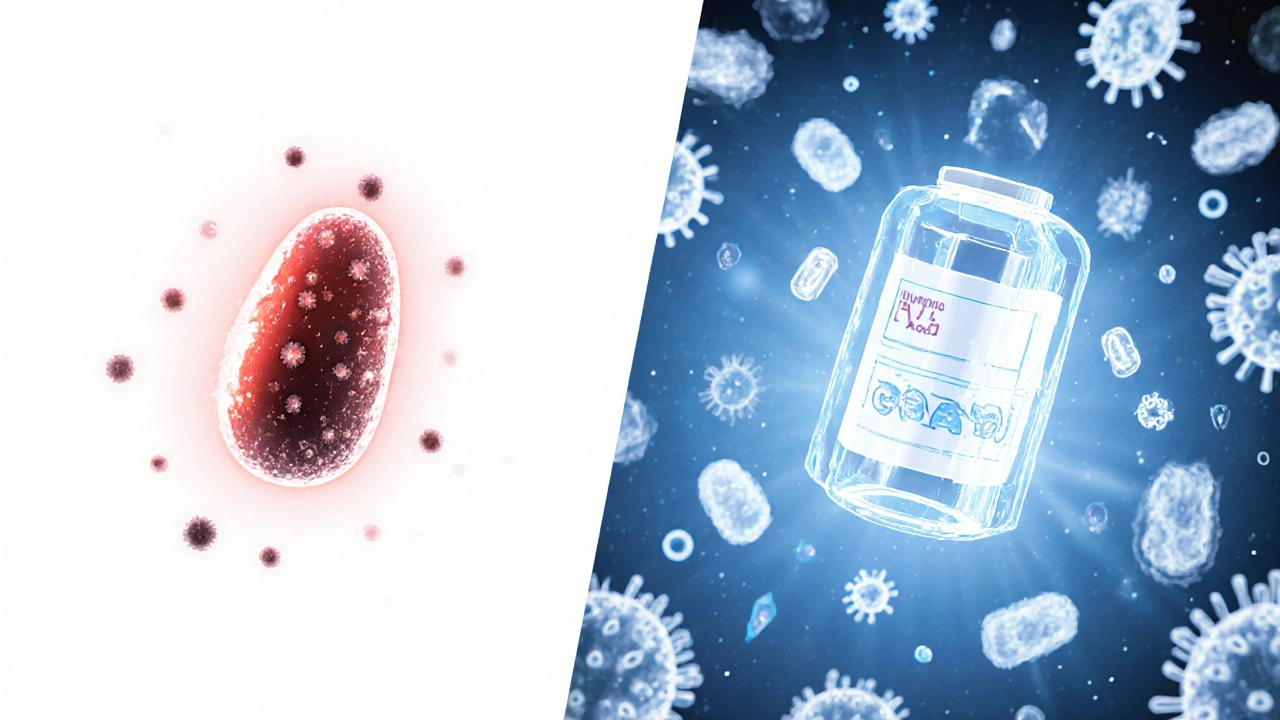Vaccinations for Immunodeficiency: Complete Safety Guide
 Oct, 12 2025
Oct, 12 2025
Vaccination Safety Checker
Vaccine Safety Assessment
This tool helps determine which vaccines are safe for patients with immunodeficiency. Input your condition details to get personalized guidance.
Enter your information to see vaccine safety recommendations.
Living with an impaired immune system raises a lot of questions about vaccines. You want protection, but you also worry about side effects. This guide walks you through what you need to know so you can make confident decisions about vaccinations and immunodeficiency.
Key Takeaways
- Most vaccines are safe for people with immunodeficiency, but live‑attenuated versions need extra caution.
- Timing matters - vaccinate before starting immunosuppressive therapy when possible.
- Inactivated vaccines (flu, COVID‑19, pneumococcal) are generally recommended for all immunocompromised patients.
- Consult your specialist to tailor the schedule to your specific condition, whether primary or secondary.
- Maintain good hygiene and herd immunity in your community to protect yourself further.
Understanding Immunodeficiency
Immunodeficiency is a condition where the body's ability to fight infections is weakened.It can be primary (genetic) or secondary (acquired through illness or medication) and affects how well you respond to vaccines. Primary immunodeficiency disease (PID) includes rare genetic disorders such as X‑linked agammaglobulinemia, while secondary immunodeficiency often results from chemotherapy, organ transplants, or long‑term steroids.
How Vaccines Work
Vaccinations are designed to train the immune system without causing disease.They stimulate an antibody response and memory T‑cells, preparing the body to fight the real pathogen if it ever shows up. In people with a healthy immune system, this process is robust. In immunodeficient patients, the response may be weaker, which is why the type of vaccine and timing become critical.

Types of Vaccines and Their Relevance
Vaccines fall into two main categories:
- Live attenuated vaccine contains a weakened form of the virus or bacterium.Because it can still replicate, it prompts a strong immune response but may pose a risk for those whose immune systems cannot control the attenuated pathogen.
- Inactivated vaccine uses killed microbes or isolated proteins.These cannot cause disease, making them safer for immunocompromised individuals, though they often require multiple doses to achieve adequate protection.
Vaccine Recommendations for Immunodeficient Patients
Guidelines from the UK NHS, CDC, and WHO converge on a core set of vaccines that are either essential or optional depending on the level of immunosuppression.
- Influenza vaccine - annual, inactivated; crucial for anyone with reduced immunity.
- COVID‑19 vaccine - mRNA or protein subunit platforms are preferred; live‑virus versions are not used.
- Pneumococcal vaccine - both PCV13 (conjugate) and PPSV23 (polysaccharide) series are advised.
- Hepatitis B vaccine - inactivated; recommended for patients on dialysis or receiving frequent blood products.
- Herd immunity boosters - ensuring family and close contacts are up‑to‑date on MMR, varicella, and tetanus protects the vulnerable.Herd immunitythe indirect protection provided when a high proportion of the community is vaccinated
Live vaccines such as MMR, varicella, and the oral polio vaccine are generally avoided in severe immunodeficiency but may be considered in mild cases after specialist review.
Timing and Scheduling Considerations
When possible, vaccinate before the immune system is compromised. If you’re about to start chemotherapy, a transplant, or high‑dose steroids, aim to complete the recommended series at least two weeks prior.
- Check the minimum interval between doses - for example, the inactivated flu vaccine should be spaced 4weeks apart from any live vaccine.
- Booster doses may be needed more frequently; some immunodeficient patients get a flu booster twice a year during peak seasons.
- Document every vaccine administration in a personal health record to avoid missed or duplicate shots.

Safety Precautions & Contraindications
Below is a quick reference comparing live‑attenuated and inactivated vaccines for immunodeficient patients.
| Aspect | Live Attenuated | Inactivated |
|---|---|---|
| Mechanism | Weakened pathogen replicates | Killed pathogen or protein subunit |
| Typical Immune Response | Strong, mimics natural infection | Weaker, may need boosters |
| Safety in Severe Immunodeficiency | Generally contraindicated | Safe and recommended |
| Examples | MMR, Varicella, Rotavirus | Influenza (inactivated), COVID‑19 mRNA, Pneumococcal |
| Typical Contraindications | High‑dose steroids, CD4 < 200 cells/µL, post‑transplant < 6months | None specific, though severe allergy to component is a concern |
Always discuss any planned travel, as some destinations require live vaccines (e.g., yellow fever). In those cases, your specialist may assess risk versus benefit or suggest a medical exemption.
Practical Tips for Patients and Caregivers
- Keep a dedicated vaccine card; note the vaccine type, batch number, and date.
- Inform every healthcare professional about your immunodeficiency status.
- Schedule appointments when you’re feeling well; fever or an active infection can blunt the vaccine response.
- Stay hydrated and have a light snack before receiving a shot to reduce fainting risk.
- Monitor for side effects for 48hours - mild soreness is normal, but persistent high fever or unusual rash warrants medical attention.
- Encourage household members to stay up‑to‑date on their vaccinations; this creates a protective “bubble.”
For those on biologic therapies (e.g., anti‑TNF agents), timing the vaccine just before the next dose often yields the best antibody response.
Frequently Asked Questions
Can I get the flu shot if I’m on steroids?
Yes. The inactivated flu vaccine is safe for most patients on low‑to‑moderate doses of steroids. High‑dose or pulse steroids may reduce effectiveness, so plan the shot during a low‑dose period if possible.
Is the COVID‑19 mRNA vaccine safe for me?
mRNA vaccines (Pfizer‑BioNTech, Moderna) are non‑live and have been shown to be safe for immunocompromised patients, including those with organ transplants. They may produce a lower antibody level, so a booster series is often recommended.
Should I avoid the MMR vaccine?
MMR is a live attenuated vaccine. If you have severe primary immunodeficiency or are on strong immunosuppressants, it is usually contraindicated. Mild cases may receive it after a thorough risk assessment.
How do I know if my antibody response is enough?
Your doctor can order serology tests (e.g., anti‑spike IgG for COVID‑19, anti‑pneumococcal capsular antibodies). If titres are low, additional booster doses may be advised.
Can I travel to a country that requires yellow fever vaccine?
Yellow fever vaccine is live. Most immunodeficient travelers receive a medical waiver, but entry requirements vary. Consult an infectious disease specialist well before departure.
Do I need extra doses of the pneumococcal vaccine?
Adults with immunodeficiency are advised to receive both PCV13 and PPSV23, spaced 8 weeks apart, followed by a repeat PPSV23 five years later. Your clinician will tailor the schedule.
What should I do if I develop a fever after a vaccine?
Mild fever (<38.5°C) within 24‑48hours is common and can be managed with paracetamol. Persistent high fever, rash, or breathing difficulty requires immediate medical attention.

Mr. Zadé Moore
October 12, 2025 AT 21:01Vaccination protocols for immunodeficiencies demand immutable adherence to evidence-based stratifications, lest we perpetuate systemic negligence.
Brooke Bevins
October 19, 2025 AT 19:41I hear you, the anxiety is real 😤. Still, the data underline that inactivated vaccines are virtually risk‑free for most immunocompromised patients, so don’t let fear dictate your health decisions! 😊
Vandita Shukla
October 26, 2025 AT 17:21Allow me to clarify the immunological rationale: live‑attenuated vaccines rely on replicative competence, which is compromised in patients with CD4 counts below 200 cells/µL, whereas subunit formulations invoke solely humoral pathways, rendering them safe irrespective of T‑cell deficits. Moreover, pharmacodynamics of corticosteroids attenuate antigen presentation, necessitating a minimum two‑week interval before immunization to maximize immunogenicity.
Samantha Gavrin
November 1, 2025 AT 12:14What the mainstream medical establishments won’t tell you is that vaccine safety data are often filtered through corporate-sponsored studies, obscuring subtle adverse events in immunodeficient cohorts. While the consensus favors inactivated vaccines, independent virology reports suggest that even mRNA platforms may trigger dysregulated cytokine responses in patients on high‑dose immunosuppressants. Proceed with caution and demand full transparency.
NIck Brown
November 6, 2025 AT 03:21Let’s cut to the chase: if you’re still debating whether the flu shot is appropriate for someone on low-dose steroids, you’re missing the forest for the trees. The guidelines are crystal clear-annual inactivated influenza vaccination is a non‑negotiable pillar of care for any immunocompromised individual. Ignoring it is simply irresponsible.
Andy McCullough
November 10, 2025 AT 04:34Building on the previous point, the immunogenicity of the quadrivalent inactivated influenza vaccine in patients receiving prednisone ≤10 mg/day remains above the protective threshold (HI titer ≥1:40) in >80% of cases, as evidenced by recent meta‑analyses. For those on higher doses, scheduling vaccination during a trough in steroid dosage maximizes seroconversion rates while minimizing potential attenuation of the adaptive response.
Zackery Brinkley
November 13, 2025 AT 15:54Exactly, Brooke! It’s easy to feel overwhelmed, but remember you’re not alone-your healthcare team is there to tailor the timing, and keeping a vaccine diary can really simplify things.
Laura Barney
November 16, 2025 AT 13:21We’ve got to stitch this tapestry together, folks-think of vaccinations as the vibrant threads that protect the whole fabric of your health. Even if you’re on immunosuppressants, you can still weave in those inactivated vaccines without tearing the pattern.
Jessica H.
November 18, 2025 AT 20:54While your metaphorical approach is appreciated, it skirts the critical nuance that not all inactivated vaccines confer equivalent immunogenicity in the context of varying immunosuppressive regimens. A more rigorous stratification matrix is essential to avoid overgeneralization.
Ted Whiteman
November 20, 2025 AT 14:34Hold up! Everyone’s acting like the vaccine safety guide is the gospel, but let’s not forget that the very concept of “complete safety” is a myth spun by pharmaceutical PR machines. Even the most polished trials conceal rare hypersensitivity events that could prove catastrophic for a fragile immune system. So, before you swallow the whole brochure, question the underlying assumptions and demand individualized risk assessments!
Reynolds Boone
November 21, 2025 AT 23:54That’s a fair point, Ted. Diving deeper, pharmacovigilance databases have indeed reported isolated cases of severe anaphylaxis post‑vaccination in patients with combined immunodeficiency, underscoring the importance of pre‑screening for IgE‑mediated sensitivities.
Angelina Wong
November 23, 2025 AT 03:41Great insights, everyone-remember, staying informed and keeping an open dialogue with your doctor is the best defense.
Anthony Burchell
November 24, 2025 AT 01:54Sure, but let’s not pretend that “just talk to your doctor” solves everything; the system’s resources are stretched thin, and sometimes you have to push harder to get the answers you deserve.
Michelle Thibodeau
November 24, 2025 AT 21:21First and foremost, navigating the labyrinth of vaccine recommendations for immunodeficient patients can feel like embarking on an odyssey through a dense, uncharted forest.
Yet, armed with the compass of evidence‑based medicine, you can chart a clear path toward protection.
Inactivated vaccines such as the seasonal influenza shot, the mRNA COVID‑19 formulations, and the pneumococcal conjugate are steadfast beacons, illuminating the way without the danger of uncontrolled replication.
Their safety profile shines especially bright for those whose immune defenses are compromised, offering a shield that is both robust and gentle.
Live‑attenuated vaccines, on the other hand, must be approached with the caution of a seasoned mountaineer eyeing a sheer cliff-only when the terrain (your immune status) is stable should you consider the ascent.
Recent longitudinal studies have demonstrated that timing the administration of inactivated vaccines at least two weeks prior to initiating high‑dose corticosteroids can boost seroconversion rates by upwards of thirty percent.
Moreover, serological monitoring after vaccination provides a valuable feedback loop, confirming whether protective antibody titres have been achieved.
For patients on biologic therapies, scheduling the inoculation just before the next infusion often yields the most favorable immune response.
Community immunity, the often‑overlooked “herd” component, acts as an additional layer of defense, wrapping around the individual like a warm, protective blanket.
Encouraging family members and close contacts to stay up‑to‑date with their vaccinations creates a sanctuary of safety that further reduces exposure risk.
When travel looms on the horizon, pre‑emptive consultation with an infectious disease specialist can tailor a bespoke vaccine regimen that accounts for regional pathogen prevalence and any requisite exemptions.
Should a mild fever or transient soreness arise post‑vaccination, simple home care-hydration, rest, and over‑the‑counter analgesics-usually suffices, while any prolonged or severe reactions merit immediate medical evaluation.
Remember, knowledge is power, and each informed decision you make adds a brick to the fortress defending your health.
Stay vigilant, stay hopeful, and trust that the collaborative effort of clinicians, researchers, and patients alike is forging a brighter, safer future for everyone facing immunodeficiency.
Your proactive engagement not only safeguards you but also contributes valuable real‑world data that can refine future guidelines.
Patrick Fithen
November 25, 2025 AT 14:01Indeed the collective effort transcends mere clinical protocol it becomes a social contract where each individual’s choice reverberates through the communal health fabric, shaping the emergent resilience of society
Michael Leaño
November 26, 2025 AT 05:18Absolutely, Patrick-by fostering that sense of shared responsibility we turn abstract science into tangible hope, lighting the way for those who feel vulnerable.
Anirban Banerjee
November 26, 2025 AT 19:11In accordance with established protocols, it is advisable to document each vaccination event meticulously, noting the vaccine type, batch number, administration date, and any adverse reactions, thereby ensuring comprehensive medical records for future reference.
Mansi Mehra
November 27, 2025 AT 07:41The article, while thorough, suffers from occasional syntactic ambiguities and misplaced modifiers that could mislead readers; a rigorous editorial review would enhance its clarity and precision.